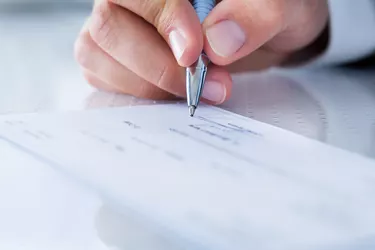
According to the Consumer Financial Protection Bureau, a power of attorney (POA) document gives one individual the authorization and rights to either represent another individual and/or act on their behalf in a number of affairs, including legal, private and business scenarios. If you have to sign a check as a power of attorney, you must first understand the particulars of your power of attorney agreement, because they are not always the same.
What is a Power of Attorney?
Video of the Day
This sort of agreement comes into play when an individual, referred to as the principal or donor, becomes incapacitated in some way, shape or form. This means that another individual (normally referred to as the agent) is required to make certain decisions for them. Being designated someone's power of attorney could require you to make life-impacting decisions on their behalf.
Video of the Day
It is often assumed that power of attorney is only invoked when an individual can no longer make their own decisions, but that isn't actually the case. Individuals with power of attorney privileges can perform certain duties for another individual, based on the documentation at the heart of this relationship.
Often, power of attorney is used for business decisions or legal matters that the principal cannot attend to, meaning they must send an agent with the right to sign for them in certain circumstances. Whether you are signing checks for elderly parents or helping a friend at the end of their life, it is essential that the power of attorney agreement specifically outline your right to participate in financial processes, if this is what you need to do.
The POA Process
The principal is the individual who creates and drafts the statement declaring what powers of attorney the agent has, and they can only do so when they have the full requisite mental capacity to complete this order and documentation. Once an individual has been incapacitated physically or mentally, they may lose the ability to grant permission, which means that an agent's power of attorney could be revoked.
In order for a principal to bestow the power of attorney onto an individual even in the event of incapacitation, the documentation must specifically describe durable power of attorney, which allows the agent to maintain their rights even if the principal becomes unable to grant specific permission.
This often happens in the case of terminal illness, where an individual might want to grant decision rights to a loved one that will be sustained even when they can no longer specifically grant permission.
Sign Check as POA
Someone appointed with power of attorney can in fact sign a check for another individual, as long as the POA agreement grants them the right to execute these financial transactions. The document that was created and signed as the power of attorney agreement was enacted will detail all of the specific cases in which the agent is able to sign in the principal's name.
For example, let's say individual A will be undergoing a complex medical procedure with a long recovery period, and they decide to give individual B the power of attorney for certain financial transactions that must be completed during that time. Individual A would then create a document defining the power of attorney being given to individual B, including transactions that are valid and transactions that are not permitted. As long as this documentation has been properly recorded, individual B will be able to perform actions in individual A's name during the specified timeframe, which could include things like depositing checks, paying for utilities or managing individual A's home.
In this case, individual B has two ways they can endorse a check as POA. The writers at Aging Care say that they can sign the check as "A, signed by B under POA", or they can sign as "B, Power of Attorney for A," says the team at Citizen's Bank. Either one of these explains the situation to all relevant parties and covers the legal requirements set forth in the power of attorney agreement.